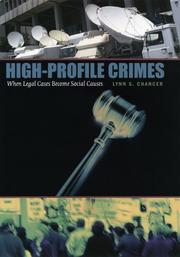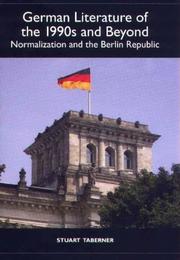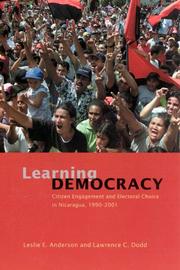| Listing 1 - 3 of 3 |
Sort by
|

ISBN: 1282537490 9786612537493 0226101134 9780226101132 9780226101125 0226101126 0226101126 9781282537491 6612537493 Year: 2005 Publisher: Chicago University of Chicago Press
Abstract | Keywords | Export | Availability | Bookmark
 Loading...
Loading...Choose an application
- Reference Manager
- EndNote
- RefWorks (Direct export to RefWorks)
O. J. Simpson. The Central Park jogger. Bensonhurst. William Kennedy Smith. Rodney King. These are more than crimes and criminals, more than court cases. They are cultural events that, for better or worse, gave concrete expression to latent social conflicts in American society. In High-Profile Crimes, Lynn Chancer explores how these cases became conflated with larger social causes on a collective level and how this phenomenon has affected the law, the media, and social movements. An astute and incisive chronicle of some of the most polarizing cases of the 1980s and 1990s, High-Profile Crimes shows that their landmark status results from the overlapping interaction of diverse participants. The merging of legal cases and social causes, Chancer argues, has wrought ambivalent effects on both social movements and the law. On the one hand, high-profile crimes offer important opportunities for emotional expression and raise awareness of social issues. But on the other hand, social problems cannot be resolved through the either/or determinations that are the goals of the legal system, creating frustration for those who look to the outcome of these cases for social progress. Guilt or innocence through the lens of the media leads to either defeat or victory for a social cause-a confounding situation that made the O. J. Simpson case, for example, unable to resolve the issues of domestic violence and police racism that it had come to symbolize. Based on nearly two hundred interviews, Chancer's discussions of the infamous Central Park jogger and Bensonhurst cases-as well as the rape trials of William Kennedy Smith and Mike Tyson, the assault cases of Rodney King and Reginald Denny, and, finally, the O. J. Simpson murder trial-provide a convincing, multidimensional and innovative analysis of the most charged public dramas of the last two decades.
Crime --- Trials --- Crime and the press --- Crime in mass media. --- Mass media and public opinion --- Crime and criminals in mass media --- Mass media --- State trials --- Court proceedings --- Procedure (Law) --- City crime --- Crime and criminals --- Crimes --- Delinquency --- Felonies --- Misdemeanors --- Urban crime --- Social problems --- Criminal justice, Administration of --- Criminal law --- Criminals --- Criminology --- Transgression (Ethics) --- Sociological aspects. --- Public opinion. --- Social aspects --- criminal, crime, legal, law, litigation, justice, enforcement, police, sociology, anthropology, case, courtroom, judge, activism, oj simpson, central park, bensonhurst, william kennedy smith, rodney king, well known, famous, culture, cultural, america, american, controversial, news, 1980s, 1990s, high profile, racism, domestic violence, interviews, rape, trial, jury, journalistic.

ISBN: 1571132899 9781571132895 9781571136725 9786611949235 128194923X 157113672X Year: 2005 Volume: *33 Publisher: Rochester (N.Y.) : Camden House,
Abstract | Keywords | Export | Availability | Bookmark
 Loading...
Loading...Choose an application
- Reference Manager
- EndNote
- RefWorks (Direct export to RefWorks)
This book presents a comprehensive, lively account of recent developments in German fiction at a moment when--for the first time in many years--German authors are once again the subject of international attention and acclaim. It introduces English-speaking audiences to the complex dilemmas that are shaping the ways in which Germans are presently defining themselves, their difficult past, and the new "Berlin Republic." The theme that runs throughout the volume is the ongoing debate on German "normalization." In offering a wide-ranging consideration of contemporary German literature, the book complements a broad discussion of trends in present-day German politics, society, and culture with detailed readings of texts by internationally renowned figures as W. G. Sebald, Günter Grass, Martin Walser, Marcel Beyer, Ingo Schulze, Judith Hermann, Thomas Brussig, and Bernhard Schlink, and by newer, emerging writers. Topics include the literary debates of the 1990s, the literary market and marketing, literary responses to the former East and West Germany in the age of globalization and to the Nazi past and portrayals of "ordinary Germans," depictions of "German wartime suffering," contemporary writing on "Jewish fates" and efforts to revive the "German-Jewish symbiosis," and finally, the recent wave of writing about the provinces.
German literature --- History and criticism. --- History and criticism --- Germany --- Weimar Republic --- Germanii︠a︡ --- Германия --- BRD --- FRN --- Jirmānīya --- جرمانيا --- Nimechchyna --- Gjermani --- Federalʹna Respublika Nimechchyny --- Veĭmarskai︠a︡ Respublika --- Ashkenaz --- Germanyah --- Bundesrepublik Deutschland --- Federal Republic of Germany --- Deutschland --- Repoblika Federalin'i Alemana --- República Federal de Alemania --- Alemania --- República de Alemania --- Bu̇gd Naĭramdakh German Uls --- Kholboony Bu̇gd Naĭramdakh German Uls --- KhBNGU --- ХБНГУ --- German Uls --- Germania --- Republika Federal Alemmana --- Deutsches Reich --- Grossdeutsches Reich --- Weimarer Republik --- Vācijā --- Germany (Territory under Allied occupation, 1945-1955) --- Germany (Territory under Allied occupation, 1945-1955 : British Zone) --- Germany (Territory under Allied occupation, 1945-1955 : French Zone) --- Germany (Territory under Allied occupation, 1945-1955 : Russian Zone) --- Germany (Territory under Allied occupation, 1945-1955 : U.S. Zone) --- Germany (East) --- Germany (West) --- Holy Roman Empire --- Intellectual life --- ドイツ --- Doitsu --- ドイツ連邦共和国 --- Doitsu Renpō Kyōwakoku --- 20th century --- 21st century --- ドイツ レンポウ キョウワコク --- Deguo --- 德国 --- Gėrman --- Герман Улс --- 1990s. --- Berlin Republic. --- German literature. --- contemporary. --- literature trends.

ISBN: 1282426079 9786612426070 0226019748 9780226019741 9780226019727 0226019721 9780226019710 0226019713 0226019713 0226019721 9781282426078 6612426071 Year: 2005 Publisher: Chicago University of Chicago Press
Abstract | Keywords | Export | Availability | Bookmark
 Loading...
Loading...Choose an application
- Reference Manager
- EndNote
- RefWorks (Direct export to RefWorks)
Historically, Nicaragua has been mired in poverty and political conflict, yet the country has become a model for the successful emergence of democracy in a developing nation. Learning Democracy tells the story of how Nicaragua overcame an authoritarian government and American interventionism by engaging in an electoral revolution that solidified its democratic self-governance. By analyzing nationwide surveys conducted during the 1990, 1996, and 2001 Nicaraguan presidential elections, Leslie E. Anderson and Lawrence C. Dodd provide insight into one of the most unexpected and intriguing recent advancements in third world politics. They offer a balanced account of the voting patterns and forward-thinking decisions that led Nicaraguans to first support the reformist Sandinista revolutionaries only to replace them with a conservative democratic regime a few years later. Addressing issues largely unexamined in Latin American studies, Learning Democracy is a unique and probing look at how the country's mass electorate moved beyond revolutionary struggle to establish a more stable democratic government by realizing the vital role of citizens in democratization processes.
Democratization --- Elections --- Political participation --- Public opinion --- Opinion, Public --- Perception, Public --- Popular opinion --- Public perception --- Public perceptions --- Judgment --- Social psychology --- Attitude (Psychology) --- Focus groups --- Reputation --- Citizen participation --- Community action --- Community involvement --- Community participation --- Involvement, Community --- Mass political behavior --- Participation, Citizen --- Participation, Community --- Participation, Political --- Political activity --- Political behavior --- Political rights --- Social participation --- Political activists --- Politics, Practical --- Electoral politics --- Franchise --- Polls --- Political science --- Plebiscite --- Political campaigns --- Representative government and representation --- Democratic consolidation --- Democratic transition --- New democracies --- Public opinion. --- Frente Sandinista de Liberación Nacional --- FSLN --- F.S.L.N. --- Sandinist National Liberation Front --- Sandinista National Liberation Front --- History --- Nicaragua --- Nikaragua --- Nikaragoua --- República de Nicaragua --- Republic of Nicaragua --- Central America (Federal Republic) --- Politics and government --- #SBIB:324H50 --- #SBIB:324H60 --- #SBIB:328H32 --- #SBIB:35H6040 --- Politieke participatie en legitimiteit (referenda, directe democratie, publieke opinie...) --- Politieke socialisatie --- Instellingen en beleid: Midden en Latijns-Amerika --- Bestuur en beleid: nationale en regionale studies: Latijns-Amerika --- democratic, government, citizens, citizen, election, electoral, voting, votes, nicaragua, south america, regional, 1990s, 2000s, history, historical, contemporary, modern, 20th century, american, united states, usa, country, governance, regime, elections, economy, candidates, public, academic, scholarly, research, textbook, democratization, intervention, interventionism. --- Frente Sandinista de Liberacion Nacional
| Listing 1 - 3 of 3 |
Sort by
|

 Search
Search Feedback
Feedback About UniCat
About UniCat  Help
Help News
News